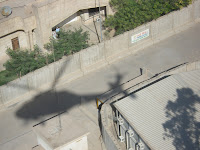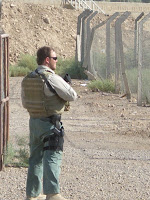The trip across the river only takes a few minutes, and so within no time we were touching down beside the "Olympic Stadium" that Saddam had built before the Gulf War in a deluded attempt to bring the Olympics to Baghdad. It would become one of his son Uday's favorite torture grounds. And now it's next to the Baghdad Police College and the jail and court complex we had built.
All elements of the rule of law complex are directly responsible to the chief judge of the CCCI (the court I visited yesterday), the Ministry of Interior, and the Ministry of Justice. The Iraqi government -- by hiring a sophisticated international contractor -- is providing all security for the complex, and is fully funding it from the state budget. The Ministry of Interior is surging every available investigator there, as the Maliki government, rejecting a proposal to establish martial law, instead called upon the CCCI to sit in emergency session to process the ballooning population of security detainees. There are plans to expand the number of judges, and of course plans are in the works to open similar compounds in Ramadi and Baquba (capital of Diyala province).






After being greeted by LAOTF's director, Mike Walther, the Minister first toured the detainee holding cells (see pictures above). Both the indoor and outdoor facilities meet humane international standards regarding space allotment, hygiene, etc. The indoor facilities hold 15 detainees to a cell, and all the detainees we spoke with raved at being there rather than other places from which they'd been transferred (including the infamous Abu Ghraib). The outdoor facilities -- large, air conditioned, tented cages -- similarly meet world standards, even if the set-up seems strange at first.
This was my second time at the ROLC, and I have yet to hear a detainee complain about the Rusafa facilities or the treatment they receive there. (For example, the complex receives 2000 male visitors and 500 female per week, and there are two doctors and five nurses on staff.) The Rusafa detention complex currently houses 5600 detainees, and is being expanded to a maximum capacity of over 7000. The hope, however, is that the number of detainees will go down and/or keep changing as people are moved through the system (more on this issue later).
Both the LAOTF Director and the Minister spent a considerable amount of time talking with the detainees, taking note of claims that certain folks were being held for no reason, or had been in detention in various places for 2-3 years without a hearing. "Nobody in prison is ever guilty," of course, but we know that a not insignificant number of detainees are held in pre-trial detention longer than the maximum sentence for their crimes, while others just got caught in a sweep at the wrong place at the wrong time.
The problem is a lack of records on so many people (80%). They've even resorted at times to asking the detainees themselves whether they know what they're in for as a preliminary record. There are just not enough capable judicial investigators (JIs), and even if there were, the police investigators (PIs) just have not done a thorough enough job of documenting arrestees. Eventually, insufficient evidence will get detainees released even when the security forces who detained them have no doubts of their guilt. The message to the Iraqi police is: if you don't want to see the most dangerous criminals back on the street in short order, you better be very thorough in the collection of evidence, and in maintaining records about the suspects you arrest. But they aren't, and so many of the most dangerous end up right back on the street to sabotage and kill again. The flipside, again, is that innocents or those picked up for light offenses languish in detention while their "no records available" files are investigated.
The Minister requested an office at the complex to monitor detainee issues, and was instantly given approval by the LAOTF chief of staff, a retired military officer and judge.
After the tour of the detention facilities, we made our way to the court and then to the office of the chief trial (as opposed to investigative) judge there. The Minister had a spirited discussion with the judge. First over jurisdiction. There is an institutional dispute over whether the ROLC would deal with only detainees from Rusafa, rather than the estimated 80% who have been brought from overcrowded jails elsewhere in Baghdad and even surrounding provinces. Just that morning, however, an agreement was reached that all detainees at the Rusafa complex would be under the Rusafa court's jurisdiction, wherever their original (and usually undocumented) provenance. The Minister insisted that more detainees be processed and either released or tried/sentenced, with the judge promising to do his best given the institutional/manpower limitations. She also asked to watch some of the trials -- which invitation was again instantly extended by the Chief of Staff.
At this point, our work being done, we were escorted back to the helipad by our very professional security detail (the guy in charge of my SUV was a South African, clearly former special forces of some kind), and made the short flight back to the IZ. (See pictures below.)








No comments:
Post a Comment